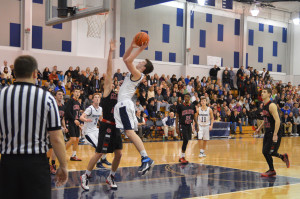Matt Freese ’17, Sarah Barr ’16: Sports are an integral part of the lives of many students, at Episcopal Academy and beyond. However, with the rise in the significance of sports achievements – recruitment opportunities, awards, overall prestige – sports specialization seems to be on the rise as well, bringing with it controversy about its overall downsides or benefits.
According to stopsportsinjuries.org, “overuse injuries are responsible for nearly half of all sports injuries to middle and high school students.” Because so many students start to focus on a singular sport so young, they work those specific muscles too hard and their other muscles not enough, leading to a multitude of injuries that would have been preventable had they focused less on the singular sport.
Another study, done by nyshi.org, indicates that specialization in sports can also lead to social isolation because it “limits experiences in other sports and activities” and athletes may “miss opportunities for important nonsport developmental experiences.” Bobby Gibson ‘17, noted that he believed “not specializing in one sport is beneficial to me personally because I have met friends through the different sports I have played.”
Concerns of being burnt out are also at play in the decision whether or not to specialize in a sport. Gibson expressed this when he noted that “specializing seems like a good idea but if you just play one sport, and also plan to play that sport in college, I think there is a really high risk that you will become tired of that sport.” With this burnout comes consequences not just for the athletes, but for teams as well, who can end up losing players that they were counting on having.
Finally, by not specializing, athletes can actually sometimes improve their performance. Julia Hondros ‘16, stated that “it’s important to keep a balance of various sports. Some sports have a crossover into other sports so it can be helpful not focusing on one. For example, basketball and field hockey cross over into lacrosse a lot.” CJ McAnally ‘17, expanded on this, noting that “college coaches want you not to specialize and play multiple sports because they want you to be a well-rounded athlete with different skills from the other sports you play.”
Essentially, while sports specialization can result in short-term success in one sport, it often leads to physical problems and burnout, and being a well-rounded athlete can lead to more overall success.

Photo courtesy of Maggie Mengel ’17
On the other hand, many benefits can also accompany specialization. For example, college recruitment happens most often through club sports. Nick Alikakos ‘17, member of Team Final Basketball Club, explained “Team Final has been a major reason I was able to get full scholarship offers and a lot of interest and national exposure. This also was because I was able to improve so much in the fall and spring because I specialized in basketball.” In speaking about his improvement in the off season, Alikakos continued to say “Specializing in a certain sport is beneficial because you can work on your main sport and improve on it rather than spending unnecessary time on something else.”
In addition, specialization is what allows athletes to truly hone their skills. Because they aren’t distracted by the training demands of other sports, they are able to actually become great players at the sport which is most interesting to them. One great lacrosse player who specialized in his position will outweigh three mediocre, more rounded athletes on the field every time.
Basically, the final question to be answered is the following: Do we want sports teams with deep rosters consisting of good players, or do we want sports teams with less depth, but great players? Well, the answer is a mixture of both. We want an athletic environment where players can focus a lot of energy on one sport, but also have the time and opportunity to play and contribute in another or two other sports. Assistant Athletic Director Jim Farrell summarized this by stating “If a kid can balance one sport where they’re really good and can also play and compete in another or two others, that is the best option. We strive for that option not only as an athletic organization but also from the educational perspectives to put them in multiple competitive environments so they can bring some skills back Into their main sports.”
The perfect example of this ideal athlete is Christian Feliziani ‘16. Feliziani plays football and lacrosse, but has put a particular amount of his energy into lacrosse. He is committed to play lacrosse at Ohio State University and is on the U19 USA National Lacrosse Team. Nonetheless, he also competes and contributes a lot to the Episcopal Football team. As a captain, he scored seven touchdowns. He stated, “Playing multiple sports benefitted me. It gave me time off of my ‘main’ sport and allowed me to not worry so much about being recruited. Playing football is something I love to do and it also kept me fit and in shape.” Although he has put a slightly greater effort into lacrosse, Feliziani found the necesary balance to be able to also contribute to the Football team.